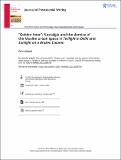Files in this item
“Golden hour” : nostalgia and the demise of the Muslim urban space in Twilight in Delhi and Sunlight on a Broken Column
Item metadata
| dc.contributor.author | Kazmi, Zehra | |
| dc.date.accessioned | 2022-11-14T13:30:03Z | |
| dc.date.available | 2022-11-14T13:30:03Z | |
| dc.date.issued | 2022-12-01 | |
| dc.identifier | 279760326 | |
| dc.identifier | 8f53bd91-e297-44f3-bf58-c9f4f9d5d5d5 | |
| dc.identifier | 85142146771 | |
| dc.identifier | 000883278600001 | |
| dc.identifier.citation | Kazmi , Z 2022 , ' “Golden hour” : nostalgia and the demise of the Muslim urban space in Twilight in Delhi and Sunlight on a Broken Column ' , Journal of Postcolonial Writing , vol. 58 , no. 6 , pp. 839-853 . https://doi.org/10.1080/17449855.2022.2083769 | en |
| dc.identifier.issn | 1744-9855 | |
| dc.identifier.other | ORCID: /0000-0003-0912-1426/work/164023930 | |
| dc.identifier.uri | https://hdl.handle.net/10023/26395 | |
| dc.description.abstract | This article explores how changing cityscapes of (post)colonial urban transition contribute to the creation of nostalgic longing in Twilight in Delhi and Sunlight on a Broken Column. Drawing from recent scholarship, it focuses on the memorialization of space and compares the ways in which narrative memory frames the perception of urbanization in both texts. Further, this study also examines the cultural location of this nostalgia and articulates the categorization of a specific Muslim nostalgia, which comes from the recognition of the anticipated political and social exclusion of the community in contemporary India. The article analyses the impact of the transformation of the city with colonization and decolonization on Muslims, as narrated in both texts. Borrowing from Svetlana Boym’s twin concepts of reflective and restorative nostalgia as analytical frameworks, a close reading reveals significantly contrasting literary perspectives when it comes to narrating the flux between modernity and tradition within the Indo Muslim imagination. | |
| dc.format.extent | 15 | |
| dc.format.extent | 807487 | |
| dc.language.iso | eng | |
| dc.relation.ispartof | Journal of Postcolonial Writing | en |
| dc.subject | Ahmed Ali | en |
| dc.subject | Attia Hosain | en |
| dc.subject | Sunlight on a Broken Column | en |
| dc.subject | Twilight in Delhi | en |
| dc.subject | Nostalgia | en |
| dc.subject | Svetlana Boym | en |
| dc.subject | T-NDAS | en |
| dc.subject | SDG 10 - Reduced Inequalities | en |
| dc.subject | SDG 11 - Sustainable Cities and Communities | en |
| dc.subject | NIS | en |
| dc.subject | MCC | en |
| dc.title | “Golden hour” : nostalgia and the demise of the Muslim urban space in Twilight in Delhi and Sunlight on a Broken Column | en |
| dc.type | Journal article | en |
| dc.contributor.institution | University of St Andrews. School of English | en |
| dc.identifier.doi | https://doi.org/10.1080/17449855.2022.2083769 | |
| dc.description.status | Peer reviewed | en |
This item appears in the following Collection(s)
Items in the St Andrews Research Repository are protected by copyright, with all rights reserved, unless otherwise indicated.

